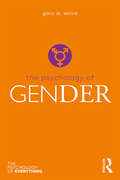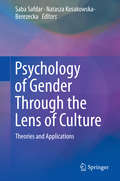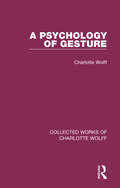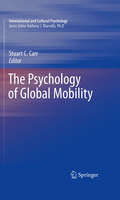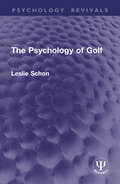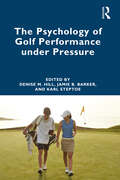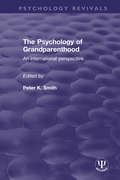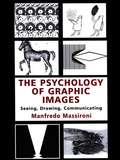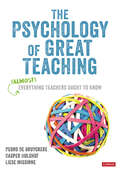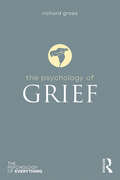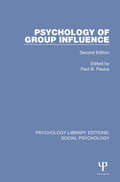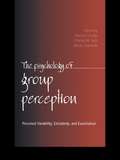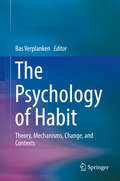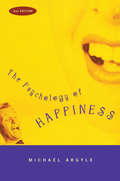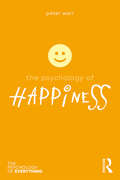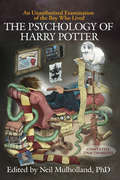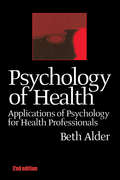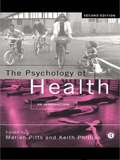- Table View
- List View
The Psychology of Gender (The Psychology of Everything)
by Gary WoodWhat is the difference between sex and gender? What is the impact of gender-role stereotypes on our lives, our relationships and the world? What does gender mean to you? The Psychology of Gender looks at our biology, history and culture to consider the impact of gender roles and stereotypes, and addresses the 'dilemmas' we have regarding gender in a post-modern world. It offers a unique perspective on gender through storytelling and explores ideas around transgender and cisgender identities and androgyny, tackling hidden assumptions and helping us make sense of the world of gender. By examining the future of gender, The Psychology of Gender offers a platform for further exploration, and arrives at a new psychology of gender that emphasises relationships and helps us to understand our own gender identity and that of those around us.
Psychology of Gender Through the Lens of Culture
by Saba Safdar Natasza Kosakowska-BerezeckaThis unique collection brings a rarely-seen indigenous and global perspective to the study of gender and psychology. Within these chapters, researchers who live and work in the countries and cultures they study examine gender-based norms, values, expression, and relations across diverse Western and non-Western societies. Familiar as well as less-covered locations and topics are analyzed, including China, New Zealand, Israel, Turkey, Central America, the experience of refugees, and gendered health inequities across Africa such as in the treatment of persons with HIV. Included, too, are examples of culturally appropriate interventions to address disparities, and data on the extent to which these steps toward equality are working. Structurally, the volume is divided into three sections. The first two parts of the book take readers on a journey to different regions of the world to illustrate the most recent trends in research concerning gender issues, and then outline present implications and future prospects for the psychological analysis of both gender & culture. The third section of the book has an applied perspective and focuses on the cultural norms and values reinforcing gender equality as well as cultural and social barriers to them. A sampling of the topics covered: Sexual orientation across culture and time. A broader conceptualization of sexism in Poland. An analysis of gender roles within the family in Switzerland Modern-day dowries in South Asian international arranged marriages. The current state of gender equality in the United States of America. Socio-cultural determinants of gender disparity in Ghana. Psychology of Gender Through the Lens of Culture is a milestone toward core human rights and goals worldwide, and a critical resource for psychologists, sociologists, anthropologists, gender studies researchers, public policy makers and all those interested in promoting gender equality throughout the world.
A Psychology of Gesture (Collected Works of Charlotte Wolff #2)
by Charlotte WolffOriginally published in 1945, this title was a follow-up to the author’s previous book The Human Hand. This time she looks at the psychology of gesture and its relation to personality. The special place that a psychology of gesture merits is obvious. It permits a direct knowledge of personality without any effort or misleading co-operation on the part of the subject, since it can be applied without his being aware of the fact. The book ‘is constructed on a system of clinical studies and medico-psychological interpretations.’ The author felt that this title must be regarded as a complementary study to her main studies.
Psychology of Gift-Giving
by Bernd StaussGift-giving is an economically significant area of consumer behavior. For we are constantly buy gifts: for Christmas and Mother’s Day, for birth and baptism, for the start of school and exams, for engagements and weddings, for birthdays or as souvenirs. Moreover, gift-giving is a very important psychological phenomenon, based on voluntariness, but also representing a duty and requiring compliance with rules. Thus, gift giving is by no means always associated with joy, but also with stress in the search for a perfect gift and disappointment when gifts fail.The book presents central results of psychological research on gift-giving. These provide answers to the following questions, among others:What ‘secret’ rules of giving and receiving do we follow?What messages do we send with our gifts?How do certain characteristics - such as the amount of the price or empathy - influence satisfaction with a Gift-giving is an economically significant area of consumer behavior. For we are constantly buy gifts: for Christmas and Mother’s Day, for birth and baptism, for the start of school and exams, for engagements and weddings, for birthdays or as souvenirs. Moreover, gift-giving is a very important psychological phenomenon, based on voluntariness, but also representing a duty and requiring compliance with rules. Thus, gift giving is by no means always associated with joy, but also with stress in the search for a perfect gift and disappointment when gifts fail. The book presents central results of psychological research on gift-giving. These provide answers to the following questions, among others: · What ‘secret’ rules of giving and receiving do we follow? · What messages do we send with our gifts? · How do certain characteristics - such as the amount of the price or empathy - influence satisfaction with a gift? · What mistakes should we avoid when giving gifts in romantic relationships? · When is a monetary gift appropriate and when is it not? The Author Prof. Dr. Dr. h.c. em. Bernd Stauss held the Chair of Service Management at the Catholic University of Eichstätt-Ingolstadt.What mistakes should we avoid when giving gifts in romantic relationships?When is a monetary gift appropriate and when is it not?The presentation of psychological gift-giving research is supplemented by references to gift-giving episodes in fiction by authors such as Paul Auster, Jonathan Franzen, Margaret Mitchell, and Thomas Mann. These illustrate the scientific findings and allow us to emotionally comprehend the experience of giving and receiving.The AuthorProf. Dr. Dr. h.c. em. Bernd Stauss held the Chair of Service Management at the Catholic University of Eichstätt-Ingolstadt.
The Psychology of Global Crises and Crisis Politics: Intervention, Resistance, Decolonization (Palgrave Studies in the Theory and History of Psychology)
by Irene Strasser Martin DegeThis edited volume brings together some of the most prominent scholars in the fields of theoretical, critical, and political psychology to examine crisis phenomena. The book investigates the role of psychology as a science in times of crisis, discusses how socio-political change affects the discipline and profession, and renders psychological interventions as forms of political action.The authors examine how notions of crisis and the interpretation of crisis scenarios are heavily intertwined with governmental and state interests. Seeking to disentangle individual subjectivity, subjectification, and science as forms of politics, the volume works toward an explicit goal to decolonize psychology. The chapters elaborate on the importance of the psychological sciences in times of crisis and the role of psychologists as practitioners. Ultimately, the diverse contributions underline the connection of scientific theory, practice, and politics.Interdisciplinary in scope and wide-ranging in its perspectives, this timely work will appeal to students and scholars of theoretical and political psychology, critical psychology, and cultural studies.
The Psychology of Global Mobility
by Stuart C. CarrHuman mobility has been a defining feature of human social evolution. In a global community, the term "mobility" captures the full gamut of types, directions, and patterns of human movement. The psychology of mobility is important because movement is inherently behavioral. Much of the behavioral study of mobility has focused on the negative - examining the trauma of forced migration, or the health consequences of the lack of adaptation - but this work looks into the benefits of mobility, such as its impact on career capital and well-being. Recent years have witnessed a phenomenal increase in efforts to understand human mobility, by social scientists, think-tanks, and policymakers alike. The book focuses on the transformational potential of mobility for human development. The book details the historical, methodological, and theoretical trajectory of human mobility (Context), followed by sections on pre-departure incentives and predispositions (Motivation), influences on acculturation, health and community fit (Adjustment), and changes in career capital, overcoming bias, and diaspora networks (Performance).
The Psychology of Golf (Psychology Revivals)
by Leslie SchonFirst published in 1922, The Psychology of Golf examines the mental side of golf from the point of view of the player, and the author’s whole aim is to assist and interest both the expert and the novice. The game of golf is nine-tenths mental and this book attempts to develop those mental skills in a golf player.
The Psychology of Golf Performance under Pressure
by Denise M. Hill Jamie B. Barker Karl SteptoeThe Psychology of Golf Performance under Pressure offers contemporary, research-informed information regarding the key psychological factors affecting golf development and performance under pressure. Through the authors’ substantive expertise – all of whom are notable scholars and/or practitioners in the field of golf psychology – the text provides a highly accessible “real world” application of theory to practice, through the provision of evidence-based guidance regarding how to maximise golf performance under pressure. Golf is a sport that has embraced sport psychology, with many of the highest ranked players in the world (male and female) openly working with a sport psychologist and advocating their importance. As a result, an increasing number of high-profile practitioners are working full-time within the sport around the world, encouraging trainee sport psychology practitioners to pursue their career within golf. Accordingly, there is an ever-increasing demand for high-quality information pertaining to the psychological demands of golf; the key psychological variables that affect golfing development and performance; and evidence-based strategies which enable effective golf performance under pressure. This novel text provides a comprehensive portrayal of the psychological factors which enable effective golfing development and optimal performance under pressure. A theoretical review of the pertinent psychological factors followed by the practical application of theory for the provision of “take home messages” will ensure that this book is of value, interest, and benefit for golfers, coaches, golf organisations, and even the parents of golfers, alongside sport psychology scholars, students, practitioners, and researchers alike.
The Psychology of Grandparenthood: An International Perspective (Psychology Revivals)
by Peter K. SmithThe majority of people will now spend about one-third of their lives as grandparents, yet developmental psychologists have largely ignored the nature of the grandparental role, and the influence which grandparents can have on grandchildren. Originally published in 1991, this book redresses the balance and uses life-span evolutionary and psychodynamic theoretical frameworks to provide a comprehensive analysis of the phenomenon of grandparenthood from cross-cultural perspectives. Much recent work in developmental psychology has disregarded the extended family in favour of the two-generational nuclear family of parents and children. But grandparents do have a significant role in family relationships and children’s development. This volume contains detailed discussion of intergenerational transmission of parenting skills, cooperation and conflict in three-generational families and the ways in which grandparents and grandchildren perceive one another. The importance of considering social and cultural contexts of development applies to grandparents just as much as to other areas of human development. Kinds of family structure, social policies regarding employment, health and housing, attitudes to marriage and even particular historical events all have an impact on the position and role of grandparents and on stereotypes of old age. These factors vary considerably from country to country. Our understanding of grandparenthood can only be enriched by learning about the variety of ways in which it is expressed in different cultural settings. Most previous research has been confined to the USA. This book is truly international containing contributions from Britain, Canada, Finland, Italy, the Netherlands, Poland, West Germany and the USA. International comparisons enable us to see which elements are essential to grandparenthood and which are culture dependant. In most Western countries the population is ageing and this sort of study is becoming vitally important. The Psychology of Grandparenthood is required reading for anybody who is professionally involved with the elderly and for psychologists interested in development, the life-span and family systems.
The Psychology of Graphic Images: Seeing, Drawing, Communicating
by Manfredo Massironi Translated by BrunoThis book explores the nature of one of the most ancient tools for nonverbal communication: drawings. They are naturally adaptable enough to meet an incredibly wide range of communication needs. But how exactly do they do their job so well? Avoiding the kinds of aesthetic rankings of different graphic domains so often made by art historians and critics, Manfredo Massironi considers an extensive and representative sample of graphic applications with an open mind. He finds a deep mutuality between the material components of images and the activation of the perceptual and cognitive processes that create and decipher them. Massironi first examines the material components themselves: the mark or line, the plane of representation (the angle formed by the actual drawing surface and the depicted objects), and the position of the viewpoint relative to the depicted objects. The roles played by these three components are independent of the content of the drawing; they function in the same way in concrete and abstract representations. He then closely scrutinizes the choices made by the person planning and executing the drawings. Given that any object can be depicted in an infinite number of different ways, the drawer performs continuous work emphasizing and excluding different features. The choices are typically unconscious and guided by his or her communicative goals. A successful graph, be it simple or complex, is always successful precisely because the emphasized features are far fewer in number than the excluded ones. Finally, he analyzes the perceptual and cognitive integrations made by the viewer. Drawings are not simply tools for communication but important instruments for investigating reality and its structure. Richly illustrated, the book includes a series of graphic exercises that enable readers to get a sense of their own perceptual and cognitive activity when inspecting images. Massironi's pathbreaking taxonomy of graphic productions will illuminate all the processes involved in producing and understanding graphic images for a wide audience, in fields ranging from perceptual and cognitive psychology through human factors and graphic design to architecture and art history.
The Psychology of Great Teaching: (Almost) Everything Teachers Ought to Know
by Pedro De Bruyckere Casper Hulshof Liese MissinneThis is your essential teaching companion that offers a broad understanding of modern psychology and how ideas from psychological theory and research can be relevant to any classroom. Explore robust, current ideas and contemporary findings from different psychological disciplines, such as cognitive psychology, developmental psychology, social psychology, personality theory and systems theory, and learn new insights to enhance your teaching. Deepen your knowledge of how students and young people develop as individuals and how a greater understanding of human behaviour can make you a more effective teacher. Each chapter includes ‘teacher takeaways’ offering practical advice on how to translate up-to-date psychological ideas into effective teaching techniques. The perfect read for teachers and those training to teach school students of any age. Pedro De Bruyckere is an educational scientist at the Artevelde University College of Applied Sciences and Leiden University. Casper Hulshof is a psychologist who teaches Educational Science at Utrecht University. Liese Missinne is an educational scientist and teacher trainer at the Artevelde University College of Applied Sciences.
The Psychology of Great Teaching: (Almost) Everything Teachers Ought to Know
by Pedro De Bruyckere Casper Hulshof Liese MissinneThis is your essential teaching companion that offers a broad understanding of modern psychology and how ideas from psychological theory and research can be relevant to any classroom. Explore robust, current ideas and contemporary findings from different psychological disciplines, such as cognitive psychology, developmental psychology, social psychology, personality theory and systems theory, and learn new insights to enhance your teaching. Deepen your knowledge of how students and young people develop as individuals and how a greater understanding of human behaviour can make you a more effective teacher. Each chapter includes ‘teacher takeaways’ offering practical advice on how to translate up-to-date psychological ideas into effective teaching techniques. The perfect read for teachers and those training to teach school students of any age. Pedro De Bruyckere is an educational scientist at the Artevelde University College of Applied Sciences and Leiden University. Casper Hulshof is a psychologist who teaches Educational Science at Utrecht University. Liese Missinne is an educational scientist and teacher trainer at the Artevelde University College of Applied Sciences.
The Psychology of Grief (The Psychology of Everything)
by Richard GrossWhat is happening emotionally when we grieve for a loved one? Is there a ‘right’ way to grieve? What effect does grief have on how we see ourselves? The Psychology of Grief is a humane and intelligent account that highlights the wide range of responses we have to losing a loved one and explores how psychologists have sought to explain this experience. From Freud’s pioneering psychoanalysis to discredited ideas that we must pass through ‘stages’ of grief, the book examines the social and cultural norms that frame or limit our understanding of the grieving process, as well as looking at the language we use to describe it. Everyone, at some point in their lives, experiences bereavement and The Psychology of Grief will help readers understand both their own and others’ feelings of grief that accompany it.
Psychology of Group and Collective Intelligence
by Yoshiko ArimaThis book integrates the findings of group research emphasizing “Madness of the Crowd” versus collective intelligence that highlights “Wisdom of the Crowd.” Thus it provides an overview of psychological research on group processes and collective intelligence, analyzing cognitive, social, and structural factors. Chapters address applications of this research to contexts such as organizations and online behavior, and offer guidelines and hands-on demonstrations of psychological principles. The book is highly relevant to students and instructors in personality and social psychology.
Psychology of Group Influence: Second Edition (Psychology Library Editions: Social Psychology)
by Paul B. PaulusOriginally published in 1989, this title showcased new developments, providing a systematic and in-depth overview of some of the basic issues in the field of group psychology. Subject areas range from basic group processes to complex interactive phenomena. There are international contributions, with chapters covering the latest developments in the field at the time. The volume provided students and professionals with a comprehensive, coherent, and interrelated picture of the broad scope of group influence processes. The volume was motivated by the belief that group psychology is a central and important activity for social psychology.
The Psychology of Group Perception: Perceived Variability, Entitativity, And Essentialism
by Olivier Corneille Charles M. Judd Vincent YzerbytThis groundbreaking work by leading social psychologists, who have all contributed in important ways to the psychology of group perception, focuses in particular on three interrelated issues: (1) whether groups are seen to be diverse or relatively homogeneous; (2) whether groups are seen as real and stable or only transitory and ephemeral; and (3) whether group membership derives from some essential quality of the members or rather is based on social constructions.
The Psychology of Habit: Theory, Mechanisms, Change, and Contexts
by Bas VerplankenThis unique reference explores the processes and nuances of human habits through social psychology and behavioral lenses. It provides a robust definition and theoretical framework for habit as well as up-to-date information on habit measurement, addressing such questions as which mechanisms are involved in habitual action and whether people can report accurately on their own habits. Specialized chapters pay close attention to how habits can be modified, as well as widely varying manifestations of habitual thoughts and behaviors, including the mechanisms of drug addiction and recovery, the repetitive characteristics of autism, and the unwitting habits of health professionals that may impede patient care. And across these pages, contributors show the potential for using the processes of maladaptive habits to replace them with positive and health-promoting ones. Throughout this volume attention is also paid to the practice of conducting habit research. Among the topics covered: Habit mechanisms and behavioral complexity.Complexities and controversies of physical activity habit.Habit discontinuities as vehicles for behavior change.Habits in depression: understanding and intervention.A critical review of habit theory of drug dependence.Questions about the automaticity of habitual behaviors. The Psychology of Habit will interest psychologists across a wide spectrum of domains: habit researchers in broader areas of social and health psychology, professionals working in (sub)clinical areas, interested scholars in marketing, consumer research, communication, and education, and public policymakers dealing with questions of behavioral change in the areas of health, sustainability, and/or education.
The Psychology of Happiness
by Michael ArgyleWhat is happiness? Why are some people happier than others? This new edition of The Psychology of Happiness provides a comprehensive and up-to-date account of research into the nature of happiness. Major research developments have occurred since publication of the first edition in 1987 – here they are brought together for the first time, often with surprising conclusions. Drawing on research from the disciplines of sociology, physiology and economics as well as psychology, Michael Argyle explores the nature of positive and negative emotions, and the psychological and cognitive processes involved in their generation. Accessible and wide-ranging coverage is provided on key issues such as: the measurements and study of happiness, mental and physical health; the effect of friendship, marriage and other relationships on positive moods; happiness, mental and physical health; the effects of work, employment and leisure; and the effects of money, class and education. The importance of individual personality traits such as optimism, purpose in life, internal control and having the right kind of goals is also analysed. New to this edition is additional material on national differences, the role of humour, and the effect of religion. Are some countries happier than others? This is just one of the controversial issues addressed by the author along the way. Finally the book discusses the practical application of research in this area, such as how happiness can be enhanced, and the effects of happiness on health, altruism and sociability. This definitive and thought-provoking work will be compulsive reading for students, researchers and the interested general reader
The Psychology of Happiness (The Psychology of Everything)
by Peter WarrIs happiness all down to luck? Do events in our life influence how happy we feel? Can too much of a good thing make us less happy? The Psychology of Happiness introduces readers to the variety of factors that can affect how happy we are. From our personality and feelings of self-worth, to our physical health and employment status, happiness is a subjective experience which will change throughout our lives. Although feeling happy is linked with positive thinking and our sociability in daily life, the book also includes surprising facts about the limitations of our personal happiness. We all want to feel happy in our lives, and The Psychology of Happiness shows us that achieving it can be both an accident of fortune and as a direct result of our own actions and influence.
The Psychology of Harry Potter: An Unauthorized Examination Of The Boy Who Lived
by Neil MulhollandHarry Potter has provided a portal to the wizarding world for millions of readers, but an examination of Harry, his friends and his enemies will take us on yet another journey: through the psyche of the Muggle (and wizard!) mind. The twists and turns of the series, as well as the psychological depth and complexity of J. K. Rowling&’s characters, have kept fans enthralled with and puzzling over the many mysteries that permeate Hogwarts and beyond: • Do the Harry Potter books encourage disobedience? • Why is everyone so fascinated by Professor Lupin? • What exactly will Harry and his friends do when they finally pass those N.E.W.T.s? • Do even wizards live by the ticking of the clock? • Is Harry destined to end up alone? And why did it take Ron and Hermione so long to get together?Now, in The Psychology of Harry Potter, leading psychologists delve into the ultimate Chamber of Secrets, analyzing human mind and motivation by examining the themes and characters that make the Harry Potter books the bestselling fantasy series of all time. Grab a spot on the nearest couch, and settle in for some fresh revelations about our favorite young wizard!
Psychology of Health: Applications of Psychology for Health Professionals
by Beth AlderFirst published in 1999. Now this popular textbook has been substantially revised and updated to include: Cutting edge research and data; Twelve chapters - ideal for term/semester teaching; Summaries of psychology theory, clearly explained; Involving and thought-provoking activities and projects; Awareness of the treatment of illness and health issues; Exercises which improve the student's therapeutic skills, making it easier to cope with professional demands and personal pressures. Psychology of Health is aimed at health professional students. Students with no prior experience in the subject will gain valuable knowledge. Relevant courses include nursing, physiotherapy. occupational therapy. speech therapy. podiatry and dietetics.
The Psychology of Health: An Introduction
by Marian Pitts Keith PhillipsThe first edition of The Psychology of Health has become the standard recommended text for many courses. This completely revised and updated second edition contains new material in all chapters and has several additional chapters on such topics as cancer, nutrition and exercise, social drugs, and the impact of social inequalities upon health. The Psychology of Health will continue to be invaluable for students of health psychology and related fields, including nursing, social work, community care and health studies.The Psychology of Health, second edition, is:* comprehensive: its four parts cover the scope and ambition of health psychology, acute and chronic illness, hospitalisation and the management of disease, primary prevention and health promotion, the importance of the family and the wider social context for health* user-friendly: includes tables, figures and boxes with discussion ideas and questions in each chapter. Prefaces to each part, key point summaries and a glossary of terms give students a useful framework for revision* clearly written by an experienced team involved in undergraduate teaching* a source for further study: with annotated guides to reading and an extensive bibliography.
The Psychology of Hope: You Can Get Here From There
by C. R. SnyderWhy do some people lead positive, hope-filled lives, while others wallow in pessimism? In The Psychology of Hope, a professor of psychology reveals the specific character traits that produce highly hopeful individuals. He offers a test to measure one's level of optimism and gives specific advice on how to become a more hopeful person.
The Psychology of Human Leadership: How To Develop Charisma and Authority
by Erich Dihsmaier Michael PaschenThe book seamlessly links fundamental insights and practical approaches to address the most important leadership problems and challenges. Each of the 11 chapters takes a close look at a specific leadership aspect and explains how to develop personal leadership qualities, such as charisma, the ability to motivate others, assertiveness, and how to overcome crises and conflicts to create new structures. Ethical questions and possible negative developments in connection with leadership and power are also examined. Unlike conventional leadership manuals, this book on leadership goes beyond the standard 'recipes' and models by providing clear trains of thought as well as a psychological and philosophical basis, and by focusing on major achievements in terms of leadership, it creates a more profound understanding and holistic view of the subject of leadership, while promoting a genuine fascination for it.
The Psychology of Human Sexuality
by Justin J. LehmillerThis book offers a comprehensive overview of human sexual behavior from a biopsychosocial perspective.
